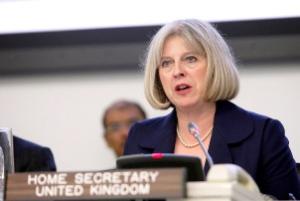In a written ministerial statement to Parliament last week. British Home Secretary Theresa May announced that her government was banning khat, a mild stimulant plant from the Horn of Africa widely used by people from the region, some of whom have emigrated to United Kingdom and other Western countries and brought their habit with them. In doing so, May went directly against the advice of the Advisory Council on the Misuse of Drugs (ACMD), the public body charged with making recommendations on the control of drugs.

In its report on the potential harms of khat in January, responding to a Home Office request for a review, the ACMD concluded that "khat should not be controlled under the Misuse of Drugs Act 1971" because "the ACMD considers that the evidence of harms associated with the use of khat is insufficient to justify control and it would be inappropriate and disproportionate to classify khat under the Misuse of Drugs Act 1971." The harm from khat "does not reach the level required for classification," the experts determined.
The ACMD found that "the evidence shows that khat has no direct causal links to adverse medical effects" other than a small number of reports about an association between its use and liver toxicity. While there were some "adverse outcomes" associated with khat use, those outcomes are the result of "a complex interaction of khat with other factors... but not directly caused by khat use."
But, while noting the AMCD's considered recommendation, May decided to ignore it.
"The AMCD report gives considerable insight into the complexity of this matter and, based on the available evidence, it came to a reasonable conclusion in its recommendations to the government," she wrote. "There are broader factors for the government to consider in making its decision. The decision to bring khat under control is finely balanced and takes into account the expert scientific advice and these broader concerns."
Those broader concerns included pressure from other northern European countries with large East African emigrant populations that have already banned khat, pressure from community health workers who say that khat use contributes to social problems such as family breakdown and unemployment, and pressure from emigrant women, who say their husbands spend too much time and money chewing the stimulant plant.
May's reasons weren't good enough for Professor David Nutt, the former head of the ACMD, who was forced out after repeated clashes with ministers over their refusing to heed the body's recommendations. Nutt is now the chair of the Independent Scientific Committee on Drugs, which issued its own report on khat.
"Banning khat shows contempt for reason and evidence, disregard for the sincere efforts of the Advisory Council on the Misuse of Drugs," Nutt said. He urged the government "to abandon plans to ban khat and to accept in full the ACMD's evidence-led recommendations of how the relatively low harms associated with this drug could be minimized."
But no. The ban on khat in Britain will go into effect within a few weeks, May said.
This work by StoptheDrugWar.org is licensed under Creative Commons Attribution-ShareAlike 4.0 International
Comments
miraa
choices have consequences
Khat
Obviously,because the prohibition of all the other plants and substances is doing so wonderfully well?You would think that at this point a people that once used the power of it's military to force opium on China would be a trifle more hesitant to jump into this slag heap yet again.I hear that Khat reduces hunger,much like chewing coca?With the state of Britian's economy you would think they might have looked more favorably on Khat.I guess that knee jerk grab at prohibition was too great to ignore?
A ban on khat is a cursethat
A ban on khat is a curse
that will backfire on the so called government.
Add new comment